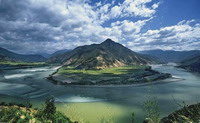Yangtze River's pollution poses serious threat to animals and plants
The Yangtze River is less polluted than expected, but only because the vast amounts of water dilute farm and industrial waste.

About 25 billion tons of waste is poured every year into the Yangtze, the world's third longest river, said a joint Chinese-Swiss expedition that analyzed the water quality of the 6,300-kilometer (3,900-mile) Yangtze.
"While the pollution level is enormous, the concentration of pollutants remains comparable with that of other rivers, given the dilution effect caused by the enormous rate of water flow," said a statement by the Swiss Agency for Development, which supported the expedition.
The pollution stems primarily from the high quantities of mineral fertilizers used in agriculture, the scientists said in presenting their report in Swiss capital, Bern. The amount of nitrogen in the river has doubled over the past 20 years, the report said.
Heavy metals in industrial waste also pollute the river, according to the scientists, who analyzed hundreds of water and sediment samples in laboratories in China, Switzerland and Australia.
About 31,900 cubic meters (1.1 million cubic feet) of water per second pours from the Yangtze into the East China Sea, the scientists said. Pollutants, including large amounts of nitrogen and arsenic, were especially concentrated in the delta.
"The more nitrate enters the sea, the more the blue-green algae grow, mainly at lower sea levels, and the oxygen becomes scarce," said Beat Mueller, a geochemist at the Swiss Federal Institute of Aquatic Science and Technology.
Independent environmental organizations said the findings should not be seen as a clean bill of health for the Yangtze.
"We find it rather misleading to focus on 'it is less than expected,"' said Ger Bergkamp, who heads the water program of the World Conservation Union, which is also known as IUCN. "But it is actually worse than any measurement before."
Water quality in the Yangtze has been deteriorating constantly and, given its large size, the Yangtze cannot be compared with other rivers, Bergkamp told The Associated Press.
"The situation is very severe, affecting people's health, the quality of water for the irrigation of crops, the water-intake to cities," he said.
Dermot O'Gorman, the country representative of the World Wildlife Fund in China, said he had not read the expedition's conclusions. But he said pollution levels in the Yangtze are very bad and the fact that pollutants tend to be diluted in the massive volume of water "still does not mean the Yangtze river is not in a dangerous situation."
The expedition team said the extinction of the freshwater baiji dolphins, which was declared in 2006, cannot be seen as a direct result of the poor water quality in the Yangtze. But industry, agriculture, increasing waterway traffic, underwater noise and fishing methods led to a rapid degradation of the baiji's natural habitat and eventually to their extinction, they said.
"The ecosystem of the Yangtze can be saved if China intensifies its activities in water protection now," said August Pfluger, director of the Zurich-based baiji.org Foundation, who organized the expedition.
The scientists said China needed to urgently adopt rehabilitation and development programs similar to those that were used to improve the quality of rivers in Europe only a short time ago.
The expedition was set up together with the Institute of Hydrobiology in Wuhan and was carried out under the auspices of the Chinese Agricultural Ministry.
Subscribe to Pravda.Ru Telegram channel, Facebook, RSS!


